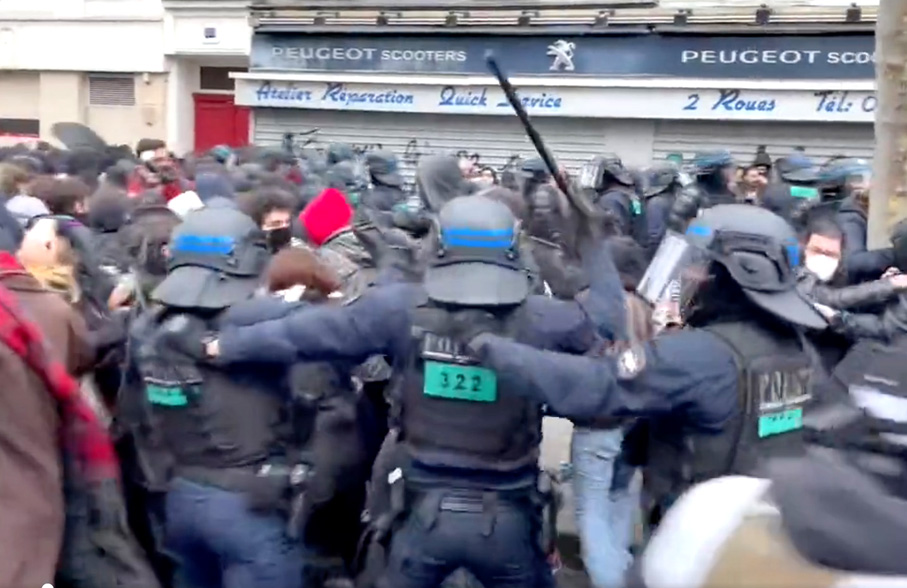IRAN’S Foreign Ministry spokesman has condemned the violence by the French police against anti-government demonstrators in the European country as demonstrating France’s non-adherence to democratic principles and freedom of speech.
Nasser Kana’ani made the comment in a post on his Twitter account on Sunday following widely-reported excessive force exerted by the French police during the latest round of mass protests over President Emmanuel Macron’s contentious pension reform.
‘The action of the French police in resorting to violence against protesting citizens of the country is unacceptable and shows the French government’s lack of commitment to the principles of democracy and freedom of expression,’ Kana’ani said in a Persian-language tweet.
‘We advise the French government to avoid duplicitous behaviour and abuse of human rights and stop resorting to violence against protesters,’ he added.
France has, over the past weeks, been the scene of protests and unrest after the government pressed ahead with the approval of a controversial draft bill claiming to ‘reform’ the country’s pension policy.
Through his proposed reforms, Macron is pushing to raise the minimum retirement age from 62 to 64, claiming it is vital if the country is to avoid the collapse of the state pension system.
Raising the retirement age by two years and extending the pay-in period would yield an additional 17.7 billion euros ($19.18 billion) in annual pension contributions, allowing the system to break even by 2027, according to the French Labour Ministry estimates.
Outrage flared last Thursday afternoon after Macron’s administration invoked a controversial constitutional power to impose the pension overhaul by decree, using a special procedure to push its pension reform without a vote in the French parliament.
Thousands took to the streets in protest, and French police intervened to clear demonstrators from the central square in Paris where thousands had gathered in front of parliament to protest against Macron.
The move sparked violent protests across the country, with police firing tear gas at some 7,000 protesters on the Place de la Concorde in Paris and arresting 310 people throughout France, including 258 in the capital.
Opinion polls show that two-thirds of the French people oppose the reform and support a protest movement organised by trade unions, who have unified behind their opposition and have warned they will continue their mobilisation.
The opposition parties have also warned the reform will penalise low wage-earners and will force people who started manual jobs at lower ages to work longer.
Trains, schools, public services, and ports have been affected by strikes over the last six weeks.
- On Saturday sit-ins were held in several countries across the world as part of a campaign aimed at denouncing the devastating effects of the sanctions imposed by the United States and the European Union on Syria.
The initiative, named ‘End the Siege’, has been joined by organisations based in a dozen countries including Jordan, Palestine, Lebanon, the UK, Germany, and Canada.
Italy’s sit-in was held in Rome, in front of the Coliseum, where members of the No-War Network and the US citizens for Peace and Justice denounced how US and EU sanctions have devastated Syria’s economy and have led to immense human suffering.
Demonstrators at the sit-in said that the US must leave Syria and stop profiting from Syrian oil and wheat which has exacerbated the poverty in the country.
Italy and Syria once maintained a robust relationship. But in 2012, one year after the outbreak of the Syrian conflict, Rome joined its western allies in closing its embassy in Damascus.
Seven years later, in 2019, when Italy had an anti-establishment government under the leadership of the Five Star Movement and the Northern League, it appeared that Rome was mulling over normalising relations with Damascus and reopening its embassy there. However, something went wrong.
The February 6th earthquake has further worsened the already deteriorating economic and humanitarian situation in Syria.
According to United Nations sources even before the earthquake tragedy, 70 per cent of the population needed humanitarian assistance due to the war in the country and the United States -European Union sanctions.
- A new survey by Gallup indicates more Democrat voters now sympathise with the Palestinians than Israel, for the first time since 2001, when the United States-based institution started polling on the Palestine conflict.
For the poll, the respondents were asked: ‘In the Middle East situation, are your sympathies more with the Israelis or more with the Palestinians?’
Forty-nine per cent said they sympathised more with Palestinians and 38 per cent sympathised more with Israel.
The Gallup report by says there has been an 11-point increase over the past year in sympathy towards the Palestinians from those who voted Democrat.
Sympathy toward the Palestinians also hit a new high among political independents, with 32 per cent sympathising with the Palestinians.
But support for Israel among Republicans remains mostly unchanged, with 78 per cent showing sympathy toward Israel compared to just 11 per cent backing the Palestinians.
The poll shows that overall, ‘sympathy toward the Palestinians among US adults is at a new high of 31%.’
The shift is largely driven by the younger generation, the poll says and shows the majority of young American people are opposed to the continuation of US arms sales to Israel.
The pattern of increasing support for the Palestinians has continued over the past five years.
The shift in US public opinion comes as Israel has escalated its violence against the Palestinians, with the regime last year killing the largest number of Palestinians in the occupied West Bank and the besieged Gaza Strip in decades.
The regime has committed acts of violence at a faster rate this year, killing 88 Palestinians so far, according to the Palestinian Health Ministry.
The formation of the new Israeli cabinet led by Benjamin Netanyahu, seen as the most far-right in the regime’s history, is likely to make matters worse.
Netanyahu’s cabinet has promised to expand the West Bank settlements.
